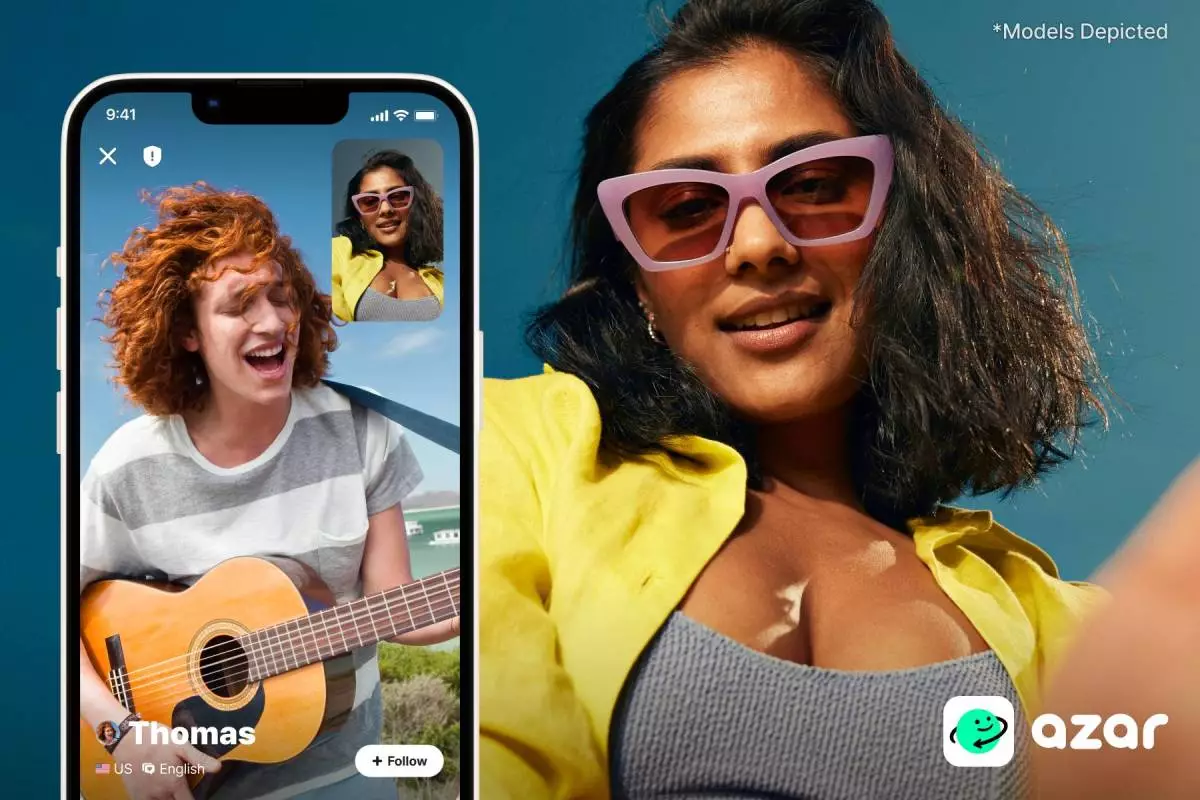Azar, the innovative video chat application, has made waves by facilitating over 100 billion connections between users around the world. Launched by the South Korea-based company Hyperconnect, which was acquired by Match Group in 2021 for a staggering $1.73 billion, Azar stands out in a crowded online communication marketplace. Despite being part of a portfolio that includes renowned dating apps like Tinder and Hinge, Azar’s core functionality is not primarily focused on dating. Instead, it offers a platform for spontaneous video interactions among strangers, carving a niche that appeals particularly to Gen Z users who seek authentic connections.
Yet, the U.S. market poses an intriguing challenge for Azar. With its entry into a country that has a vivid history of random video chat platforms, the stakes are high. Users of previous-generation platforms like Omegle and Chatroulette often recall unfortunate encounters, turning what could be a fun experience into a quagmire of unpredictability. While Omegle recently shut down amidst serious legal troubles, Chatroulette continues to exist but has earned notoriety for safety concerns and a lack of moderation. In light of this history, Azar is tasked with reshaping perceptions and demonstrating that video chatting can be safe and enjoyable.
The landscape of digital interaction has evolved dramatically, especially post-pandemic, which has yielded an increased desire for connection. Social media trends have highlighted a yearning among the younger population for immediacy and authenticity—characteristics that Azar harnesses effectively. Unlike its predecessors, Azar implements a unique system that emphasizes user safety. The company employs a combination of artificial intelligence and human moderation to mitigate risks associated with random video interactions.
As CEO Linda Kim explains, the platform utilizes automated tools to detect inappropriate behavior and content before human moderators step in to handle problematic cases. This proactive approach aims to foster a safe environment where users can engage without the looming fear of encountering unsuitable behavior. By prioritizing safety, Azar attempts to differentiate itself from the stigma surrounding random video chat applications.
Azar’s growing popularity can largely be attributed to its Gen Z user base, who are naturally tech-savvy and embracing of new forms of communication. Kim notes that many of these users are eager for spontaneous conversations that transcend language barriers, thanks to the app’s instant translation feature. This unique twist allows individuals from diverse backgrounds to connect, further enriching the experience of global camaraderie.
Interestingly, Kim herself uses Azar as any regular user would—seeking travel tips and advice while remaining anonymous. This hands-on familiarity with the user experience informs her strategies for growth and improvement of the app, allowing her to resonate with the typical Azar user effectively.
Emerging trends indicate that Gen Z experiences heightened levels of loneliness, partly attributed to social media’s paradoxical relationship with connection. As Amy Wu notes, there is growing recognition of the loneliness epidemic. In this context, social interaction apps like Azar may materially contribute to addressing this pervasive issue by fostering a sense of belonging and connection among users who feel isolated.
Navigating User Concerns
However, Azar’s ambitious trajectory into the U.S. market isn’t devoid of challenges. For many, the notion of engaging in face-to-face conversations with strangers can evoke anxiety and unease. To alleviate these concerns, Azar provides users the option to use augmented reality (AR) filters to mask their identities. However, as experienced by some users, the effectiveness of these features may vary based on individual preferences and engagement comfort levels.
Furthermore, maintaining user safety and instilling confidence in the platform is crucial. Kim acknowledges the skepticism towards random video apps and the importance of addressing safety concerns directly. By investing in robust moderation processes and ensuring that users are educated about safe practices while using the platform, Azar hopes to mitigate the fears historically associated with this type of technology.
As Azar embarks on its journey to establish a lasting presence in the U.S., its success will rely on how effectively it navigates the challenges of a rugged digital landscape. By actively addressing concerns around user safety and capitalizing on the innate desire for connection among younger demographics, Azar can reshape the future of random video chats. Eager and willing users stand ready to embrace new ways of connecting—if Azar can maintain the commitment to safety and respect that Kim envisions. The digital world is ripe for fresh connections, and Azar is strategically poised to meet this emerging demand.

